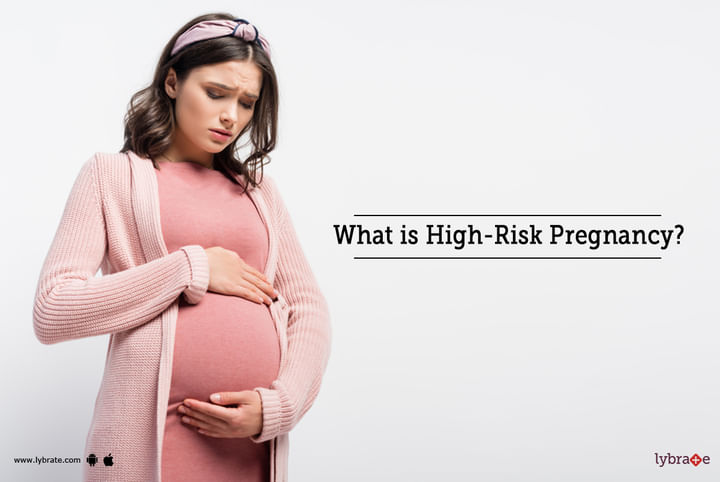Get the App
For Doctors
Login/Sign-up
Last Updated: May 10, 2023
BookMark
Report
10 Tips for Managing a High-Risk Pregnancy
What is High-Risk Pregnancy?
High risk pregnancy is a pregnancy that carries an increased chance of complications and adverse outcomes for the mother, baby, or both.
Factors that can increase the risk of a high-risk pregnancy include advanced maternal age, obesity, pre-existing medical conditions (such as diabetes or hypertension), multiple foetuses, smoking, and prior history of preterm labour.
Types of High risk pregnancy :
- Multiple Gestation Pregnancy: This type of high-risk pregnancy occurs when a woman is carrying more than one baby, such as twins, triplets, or higher-order multiples. Carrying multiple babies increases the risk of preterm labour and delivery, as well as other complications during pregnancy and childbirth.
- Gestational Diabetes: A woman may acquire gestational diabetes throughout her pregnancy if she experiences changes in her body's hormones that cause her to develop high blood sugar levels.If gestational diabetes isn't properly managed throughout the pregnancy, it can lead to serious complications for both mother and baby, including preterm labour and delivery and an increased risk of caesarean delivery.
- High Blood Pressure During Pregnancy: High blood pressure (also known as hypertension) during pregnancy increases the risk of preterm labour, preeclampsia (a serious condition that affects both mother and baby), and other problems for the mother and baby.
- Preterm Labour: When labour occurs before 37 weeks of pregnancy, this is referred to as preterm labour.This can lead to complications if not monitored closely by a doctor or if left untreated, such as low birth weight or birth defects in the baby.
- Placenta Abruption: A situation known as placenta abruption is one in which the placenta becomes partly or totally detached from the wall of the uterus prior to the delivery of the baby.This can lead to severe bleeding in both mother and baby, preterm labour, or even stillbirth in some cases.
What are the signs and symptoms of High-Risk Pregnancy?
- Advanced Maternal Age: Women who are pregnant over the age of 35 years are considered to be at high risk of having a complicated pregnancy. This is due to the increased risk of chromosomal abnormalities, preterm labour and preeclampsia.
- Existing Medical Conditions: Women with existing medical conditions such as hypertension, diabetes, kidney diseases and heart diseases have an increased risk of complications during pregnancy.
- Multiple Gestation: Women who are expecting twins, triplets, or more infants are at an increased risk of difficulties during pregnancy, including preterm labour and preeclampsia. This risk increases as the number of babies in the pregnancy increases.
- Previous Pregnancy Complications: Women who have had a previous complicated pregnancy such as preterm labour or preeclampsia, have an increased risk for the same complication in subsequent pregnancies.
- Excessive Weight Gain During Pregnancy: Women who gain excessive weight during pregnancy are at an increased risk for gestational diabetes and pre-eclampsia.
- Low or High Amniotic Fluid Levels: Low amniotic fluid levels can lead to intrauterine growth restriction while high amniotic fluid levels can lead to premature rupture of membranes or placental abruption causing complications during delivery.
What are possible complications of High-Risk Pregnancy?
- Preterm labour and delivery: High-risk pregnancies are more likely to result in preterm labour and delivery, which can lead to a variety of health problems for the baby as they may not have had enough time to fully develop in the womb.
- Birth defects: High-risk pregnancies may also be associated with an increased risk of birth defects due to genetic or environmental factors.
- Gestational diabetes: Women with high-risk pregnancies may be at an increased risk of developing gestational diabetes, which can have serious implications for both mother and baby if left untreated.
- Preeclampsia: Preeclampsia is a serious condition that can occur during pregnancy, and women with high-risk pregnancies are more likely to develop it.It is distinguished by high blood pressure and the presence of protein in the urine, and if it is not treated, it can result in major problems to the patient's health.
- Placental abruption: Placental abruption is a serious condition in which the placenta separates from the uterine wall before delivery, depriving the baby of oxygen and nutrients needed for proper development.
- Foetal growth restriction: Women with high-risk pregnancies are more likely to experience foetal growth restriction, which means that the baby does not grow as expected in the uterus due to inadequate nutrition or other factors, resulting in health complications for both mother and baby.
10 Tips for Managing a High-Risk Pregnancy
- Dhanvantari Rasayana: This herbal remedy helps to nourish the body and strengthen the reproductive system. It is known to reduce the risk of high-risk pregnancy by promoting better immunity, improving hormonal balance, and regulating blood sugar levels.
- Virechana: This Ayurvedic purification treatment is known to reduce toxins in the body and improve overall health. It is believed to help reduce the risk of high-risk pregnancy by improving digestion, detoxifying the body, and balancing hormones.
- Udvartana: This Ayurvedic massage therapy helps to reduce stress and tension in pregnant women, which can be a major cause of complications during pregnancy. It helps to improve circulation, reduce swelling, and stimulate healing throughout the body.
- Pranayama: This breathing exercise helps to relax the mind and body during times of stress or tension. It is believed to help improve blood flow throughout the body, improve oxygen levels in the bloodstream, and reduce anxiety levels for pregnant women who are at risk for high-risk pregnancies.
- Getting enough rest: Getting enough sleep is especially important for a woman with a high-risk pregnancy. It is recommended that she get 7-8 hours of sleep each night and take several short naps during the day if possible.
- Avoiding stress: Stress can contribute to high blood pressure and other medical issues, so it is important that women with high-risk pregnancies take steps to reduce their stress levels as much as possible. Finding time to relax by taking walks, reading, or spending time in nature can help to reduce stress levels.
- Exercising regularly: Regular exercise has been shown to reduce the risk of complications during pregnancy and can even lead to improved outcomes for some women with high-risk pregnancies. Low-impact activities such as walking, swimming, or yoga are ideal for pregnant women and can help them stay fit and healthy throughout their pregnancy.
- Taking prenatal vitamins: Taking prenatal vitamins can help ensure that mothers are getting adequate amounts of essential vitamins and minerals during their pregnancy, which can improve outcomes for both mother and baby.
- Abhyanga: Abhyanga is a type of Ayurvedic massage that helps to improve circulation in the body and reduce stress levels.During a pregnancy with a high risk of complications, this can assist to enhance both the mother's and the unborn child's general health.
- Aromatherapy:Aromatherapy is an age-old practise that involves diffusing essential oils in the air to induce a state of relaxation and lower levels of tension. It has been used for many decades to treat a wide variety of illnesses, including pregnancy that is high risk.Aromatherapy can help reduce anxiety, depression and other emotional disturbances that come with a high risk pregnancy.
- Diet: Eating a balanced diet rich in fresh fruits and vegetables is important for all pregnant women, but even more so for those at high risk of complications. Eating foods like legumes, nuts, fish, whole grains, leafy greens and plenty of fruits can help provide essential nutrients needed by both mother and baby during this time.
- Herbal Medicines: Certain herbal medicines have been used in Ayurveda for centuries to treat various conditions during pregnancy, including those associated with high risk pregnancies. Herbs such as ashwagandha, shatavari, amalaki and guduchi are often recommended by Ayurvedic practitioners for their calming effects on the mind and body as well as their ability to nourish the mother’s body during this time.
What are the surgical treatments for High-Risk Pregnancy?
- C-section:In order to deliver the baby, a caesarean section, often known as a C-section, is a type of surgical surgery in which an incision is made in the abdomen and uterus of the mother.This is typically done when it is too dangerous for a vaginal delivery.
- Foetal surgery: Foetal surgery may be performed if there are concerns about the baby’s health before birth. This type of surgery may be done either through an incision in the mother’s abdomen (open foetal surgery) or by inserting tiny cameras and instruments into the uterus via small incisions in the abdomen (minimally invasive foetal surgery).
- Amniocentesis: This procedure involves taking a sample of amniotic fluid from the uterus using a needle inserted through the abdomen. It can be used to detect genetic abnormalities, assess foetal lung maturity, or assess infection risk.
- Cerclage: A cerclage is a surgical procedure in which stitches are placed around the cervix to help prevent preterm labour or delivery.
- Hysterectomy: In some cases, especially when there is an underlying medical condition like cancer, a hysterectomy may be necessary to protect the health of both mother and baby during pregnancy.
Best doctors to consult for High-Risk Pregnancy?
- Maternal-Foetal Medicine Physicians: Maternal-Foetal Medicine (MFM) physicians specialise in the care of women with high-risk pregnancies. They are trained to identify potential problems, manage and monitor the health of both mother and baby, and provide comprehensive prenatal care for pregnant women at risk for medical, obstetrical, or genetic complications.
- Obstetricians: Obstetricians are specialists in pregnancy, childbirth, and postpartum care. They can provide comprehensive prenatal care for mothers at high risk for pregnancy complications.
- Genetic Counsellors: Genetic counsellors are specially trained healthcare professionals who provide counselling to families at risk for certain types of genetic disorders or birth defects. They can provide counselling on the risks associated with a high-risk pregnancy, including the potential risks to both mother and baby as well as testing options available to assess those risks.
- Perinatologists: Perinatologists are specialists in high-risk pregnancies who can provide comprehensive prenatal care to pregnant women at risk for medical or obstetrical complications. They are also trained in diagnosing and managing foetal abnormalities and certain maternal conditions that may put a pregnancy at higher risk of complications.
- Family Practitioners: Family practitioners may also be consulted in cases of high-risk pregnancies if they have experience managing these types of cases.
In case you have a concern or query you can always consult a specialist & get answers to your questions!



+1.svg)
